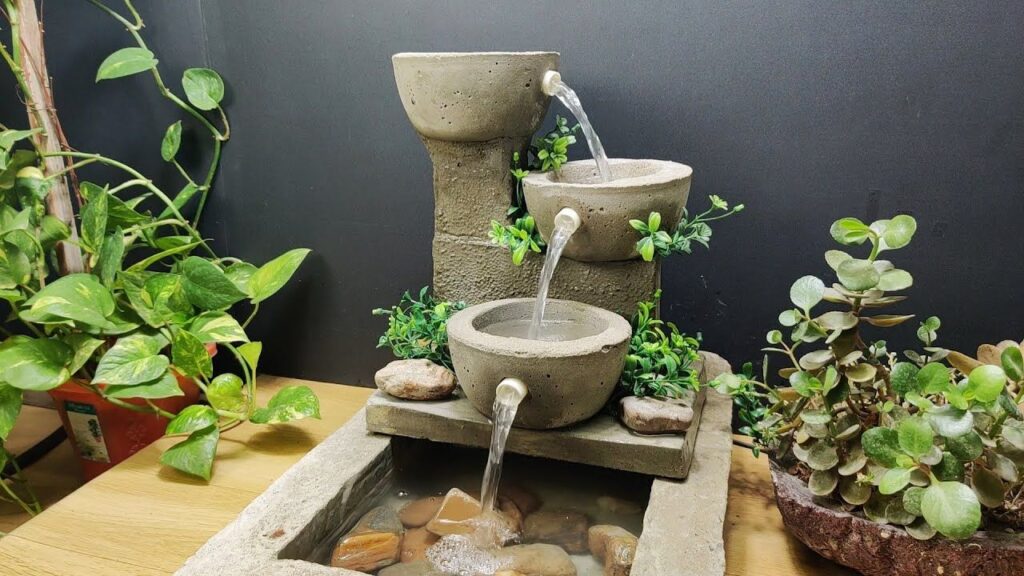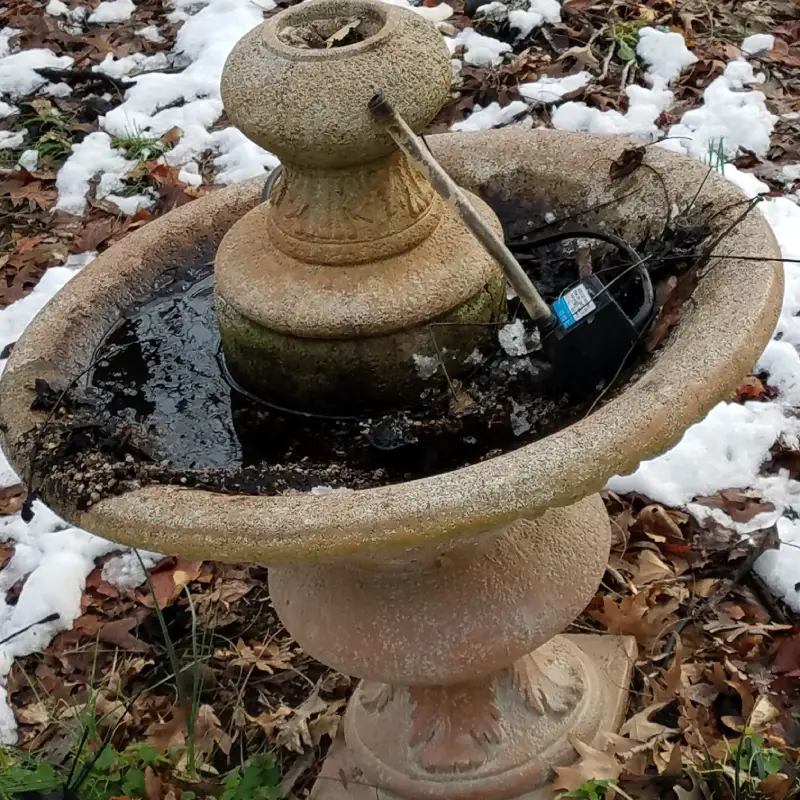In Feng Shui practices, water fountains play more than a purely decorative role; they are instruments of harmony, prosperity and emotional well-being. When properly placed and meticulously maintained, fountains activate the water element, inviting a flow of positive energy (Qi) into your living space.
However, that doesn’t mean you can go to the market and buy a water fountain and place it wherever you want. You must understand its characteristics, and the appropriate positions recorded in the Feng Shui dictionary to ensure its benefits are optimally exploited. Understanding this problem, LotusBuddhas will guide you on how to use the water fountain according to Feng Shui’s strict principles in this article.
Meaning and uses of water fountains
In Feng Shui, water fountains serve as multi-faceted instruments that impact various dimensions of human life. One of the primary benefits of incorporating a water fountain into your space is the promotion of a tranquil and harmonious atmosphere. The auditory experience of trickling water serves as an auditory balm, facilitating relaxation and the alleviation of stress.
Equally significant is the fountain’s role in introducing the water element into your environment. According to the principles of Feng Shui, each element activates specific qualities in your life. In the case of water, its dual nature—being either deep and still like a lake or flowing like a river—corresponds to distinct human qualities. The more profound aspects of water are associated with wisdom, intuition and insight. In contrast, its flowing characteristics pertain to social connections and one’s interaction with the external world. Consequently, the strategic placement of a water fountain can help in inviting either wisdom and depth or expanding one’s social network.
Moreover, the concept of wealth, abundance, and cash flow is inextricably linked with flowing water in Feng Shui. Hence, fountains are frequently utilized as a mechanism for attracting financial prosperity. While the general principle remains consistent, the efficacy of this technique can be optimized by placing the fountain in specific zones within your home.
The continuous movement of water in a fountain aids in the stimulation of qi, the vital life force in Feng Shui. One of the primary objectives of Feng Shui is to balance and enhance the flow of qi in a given space. A fountain serves as a dynamic tool to ensure that qi doesn’t become stagnant. A static qi flow can result in obstacles and challenges in various life domains. Therefore, a water fountain not only aesthetically enhances a space but also acts as a catalyst for positive changes in multiple spheres of life.
Different types of fountains
When selecting a fountain, multiple variables come into play, including the material, dimensions, and aesthetic compatibility with your living space. Each material correlates with one of the Five Elements in Feng Shui, thereby influencing distinct qualities in your life.
For example, a metal fountain, constructed from stainless steel or copper, aligns with the metal element. Incorporating such a fountain into your space can usher in attributes related to precision, organization and joy. Alternatively, if you seek to invite more earth energy, characterized by stability and grounding, a fountain crafted from stone or ceramic would be more appropriate.
Fountains also present a diverse range of shapes and sizes, each of which has unique considerations for placement and installation. Floor-based fountains, often quite tall, are substantial but require adequate space. Wall-hanging fountains offer a visually pleasing vertical element, but their considerable weight demands professional installation. The most user-friendly option is a tabletop fountain, which can be conveniently situated on any horizontal surface such as a table or shelf.
However, the most vital criterion for selection is your personal affinity for the fountain. It is imperative to choose a piece that harmonizes with your style and decor preferences, thereby ensuring that the fountain serves as a perennial source of joy and satisfaction in your home.
Benefits of having a water fountain indoors
As you know, incorporating a fountain in your home has many comprehensive benefits that can enrich many different aspects of your life. But what exactly are those benefits? Please continue reading this next part!
Emotional Tranquility: The sound of flowing water inherently possesses calming qualities, facilitating emotional well-being by reducing stress and anxiety levels.
Enhanced Focus and Concentration: The gentle sound of water can serve as white noise, aiding in concentration and enhancing cognitive function during tasks that require focus.
Activation of Career Qualities: Strategically placing a water fountain in the career sector of your home, known as the Kan area in Feng Shui, can fortify aspects like wisdom and networking essential for professional advancement.
Financial Prosperity: The flow of water, particularly in the entrance of your home, symbolizes the flow of wealth and abundance, thereby potentially improving your financial situation.
Stimulation of Qi: The constant movement of water helps to energize and stir the flow of qi, or life force, ensuring that it circulates freely and does not stagnate, which is integral for overall vitality.
Balance of Elements: The material of the fountain can be selected to introduce or balance specific elements within your home, such as metal for organization or earth for grounding.
Enhancement of Social Interactions: Water’s flowing aspect is linked to social connectivity; thus, a fountain can be a catalyst for improving your social network and interactions.
Aesthetic Pleasure: Beyond its functional benefits, a carefully chosen fountain aligns with your personal style and serves as an aesthetic centerpiece, offering visual and sensory enjoyment.
Environmental Humidity: The presence of a water feature can subtly increase the humidity within an indoor space, beneficial for skin, respiratory health and general comfort.
Space Harmonization: The fountain serves to blend natural elements into the architectural structure of your home, contributing to a harmonious and balanced living environment.
Where to place a water fountain in your home
You already know the meaning and uses of water fountain, right? But as LotusBuddhas shared at the beginning of the article, you need to determine the correct placement according to Feng Shui principles to optimally exploit its benefits.
One ideal location for a water fountain is the Kan (Career) area on the Feng Shui Bagua map. This area is inherently associated with the water element, which is closely tied to qualities such as wisdom, knowledge and social connections—factors that are crucial for career advancement. By placing a water fountain in this specific area, you have the potential to bolster these essential attributes in your professional life.
Furthermore, you may consider positioning a fountain in the areas related to the wood element, namely Xun (Wealth and Abundance) and Zhen (Family and New Beginnings) sectors of the Bagua map. The rationale behind this placement lies in the symbiotic relationship between the water and wood elements. Just as water nurtures plants and trees in the natural world, placing a water fountain in wood-related areas can promote growth and prosperity in the corresponding facets of your life.
The entrance of your home, also termed as the “mouth of qi,” presents another strategic location for a water fountain. This area serves as the portal through which energy and opportunities flow into your living space and, consequently, your life. The orientation of the water flow is equally important in this context. Ideally, the water should flow upwards and then cascade downwards. If the water flows in a singular direction, it is imperative that it flows inward, towards the interior of the home. This orientation serves to invite and channel wealth into your life rather than ushering it out.
Feng Shui taboos when placing a water fountain
While the incorporation of a water fountain can yield numerous benefits, it is equally crucial to be aware of the taboos associated with its placement. LotusBuddhas wants to remind you that, failure to adhere to these guidelines can inadvertently introduce negative energy or counterproductive elements into your living environment.
- Bedroom Placement: Installing a water fountain in the bedroom is generally considered inadvisable, as it can lead to restlessness and potential disruptions in romantic relationships.
- Direct Alignment with Doorways: Placing a fountain directly in line with the front door or other significant entryways can result in the outward flow of positive energy, negating the benefits you seek to invite.
- Imbalance of Elements: Fountains introduced into areas already dominated by the water element can create an imbalance, leading to potential stagnation in the corresponding aspects of your life.
- Inconsistent Flow: Ensure that the water flows smoothly and cleanly. Stagnant or dirty water is symbolic of neglected energy and can attract negative vibes.
- Outward Flow: The direction of the water flow should ideally be towards the interior of the home. Water flowing outward can symbolize financial resources and opportunities flowing away from you.
- Improper Sizing: A fountain that is disproportionately large or small for a space can create imbalance, leading to adverse effects rather than the intended benefits.
- Excessive Noise: While the sound of water is generally calming, an overly loud fountain can generate stress and become counterproductive to the peaceful atmosphere you aim to create.
- Under the Staircase: Placing a fountain under a staircase is considered to generate downward energy, potentially leading to a feeling of suppression or burden.
- Proximity to Fire Elements: Positioning a water fountain too close to fire elements, like a stove or fireplace, can lead to a clash of energies and create disharmony.
- Lack of Regular Maintenance: A neglected fountain not only becomes ineffective but can also turn into a source of stagnant energy, which is detrimental to the positive flow of qi.
LotusBuddhas hopes that once you are aware of these taboos, you can maximize the benefits of incorporating a fountain in your home while minimizing the potential pitfalls. Proper placement and maintenance are key to effectively harnessing the positive effects of fountains.
How to maintain water fountains
To optimize the Feng Shui benefits of an indoor fountain, meticulous maintenance is a must. A well-maintained fountain not only serves an aesthetic purpose but also maintains a harmonious flow of energy, which positively affects many different aspects of your Feng Shui and also your life.
Regular Cleaning: Consistent cleaning prevents the accumulation of algae and mineral deposits. It’s essential to disassemble and scrub each part, including the pump, at least once a month.
Water Quality: Utilize distilled or purified water to minimize mineral buildup and maintain a clean flow. Stagnant or cloudy water is counterproductive to positive energy circulation.
Water Level Monitoring: Ensure that the water level never falls below the pump’s intake to avoid damaging the pump and creating disruptive noises. A consistently full fountain supports a continuous flow of positive energy.
Filter Replacement: If your fountain has a filter, adhere to manufacturer guidelines for regular replacement or cleaning. A functional filter contributes to cleaner water and, consequently, better Feng Shui.
Pump Inspection: Routinely inspect the pump to verify it is operating smoothly. A malfunctioning pump can hinder the flow of water, which in Feng Shui terms translates to obstructed flow of life opportunities.
Aesthetic Review: Periodically review the fountain’s aesthetics, including any decorative elements like stones or plants. These should be clean and neatly arranged to foster a balanced and appealing visual energy.
Noise Management: Ensure that the sound emitted is pleasant and soothing. Any harsh or abrupt noises can contribute to a discordant atmosphere, which is antithetical to the principles of Feng Shui.
Seasonal Adjustments: Some climates may require you to bring the fountain indoors during winter months to prevent freezing and potential damage, or to take additional steps for algae control in warmer seasons.
Energy Reassessment: Regularly reassess the flow and placement of the fountain in relation to other elements within your living space. Changes in household dynamics might necessitate adjustments for maintaining positive energy flow.
In short, if your home area is large enough and suitable for placing a water fountain, it will be great, it will help you a lot. From emotional tranquility to financial prosperity, the benefits are diverse.










